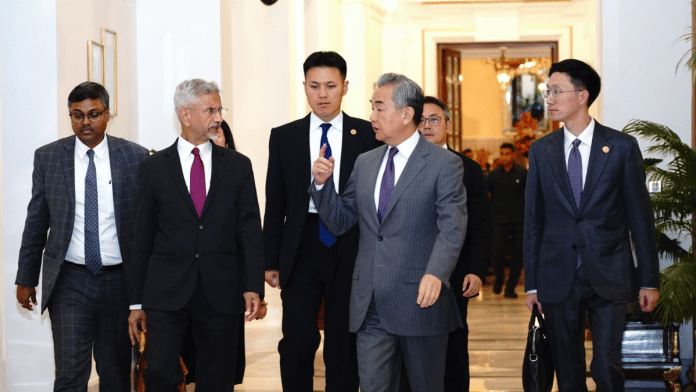New Delhi: Chinese Foreign Minister Wang Yi gave assurances to address key concerns including in areas such as rare earths and fertilisers, during his meeting with External Affairs Minister S. Jaishankar Monday, ThePrint has learnt.
The assurances come ahead of an expected visit by Prime Minister Narendra Modi to China later this month.
“China promises to address three key concerns of India. Foreign Minister Wang Yi assured External Affairs Minister [S. Jaishankar] that China is addressing India’s needs of fertilisers, rare earths and tunnel boring machines (TBMs),” a government source informed ThePrint.
Jaishankar had raised India’s concerns during his meeting with Wang Yi. The two countries, he added, now “seek to move ahead” following a “difficult period in ties”. A number of topics were on the agenda including economic ties, border trade, connectivity and river data sharing.
The assurances by Wang Yi comes as imports of these goods from China have been impacted in the last year. For example, China was the largest source for urea, a key crop nutrient used by farmers in India. In June 2024, Beijing restricted the export of urea globally.
Earlier in the year, Beijing did not remove the restrictions for the export of urea to India earlier this year, when it did so for other countries. Bloomberg first reported last week that Beijing has moved to remove the restrictions of the export of urea to India.
India imported roughly $774 million of the crop nutrient from China in the 2023-2024 financial year, according to data published by the Ministry of Commerce and Industry. However, in the last financial year (2024-2025), India’s urea imports fell to $42.8 million due to Beijing’s curbs on exports.
China has been tightening its export regime of rare earth elements (REE’s) in the last few months as its trade war with the US heated up. The China-US trade war severely impacted the export of REEs to other countries, especially India. REEs are critical components of green technologies and India’s transition to cleaner energy systems.
The Chinese Foreign Minister is on a three-day visit to India, which began on 18 August. He is scheduled to meet with National Security Adviser Ajit Doval Tuesday as a part of the Special Representative on the border question mechanism, following which he is expected to call on Prime Minister Narendra Modi later in the evening. Wang Yi is set to depart for Pakistan from India Wednesday.
The meeting between Indian and Chinese leadership comes at a time when ties between New Delhi and Washington D.C. have hit a rough patch. US President Donald Trump has taken aim at India’s continued oil purchases from Russia, asserting that New Delhi has been funding Moscow’s war machine. Trump imposed tariffs of up to 50 percent on India earlier this month, which is one of the highest for any of the US’ trading partners.
Prime Minister Modi is expected to make his first visit to China since 2018 later this month to attend the Heads of State Summit of the Shanghai Cooperation Organisation (SCO) at Tianjin on 31 August and 1 September.
Wang Yi’s visit will likely finalise the agenda of Modi’s visit to China. Ties between New Delhi and Beijing cratered in 2020 following the military clashes in Galwan. Engagement at the highest levels remained minimal until Indian Foreign Secretary Vikram Misri announced that the two countries had reached an agreement for disengagement at the friction points across the Line of Actual Control (LAC) on 21 October 2024.
Two days later, Modi met with Chinese President Xi Jinping on the margins of the BRICS summit in Kazan, Russia. This paved the way for the restarting of various bilateral mechanisms.
“Wang noted that the successful meeting between President Xi Jinping and Prime Minister Narendra Modi in Kazan has guided the restart and renewal of China-India relations. Both sides have earnestly implemented the consensus reached by their leaders, gradually resuming exchanges and dialogues at various levels, maintaining peace and tranquility in border areas, and restarting Indian pilgrims’ visits to the sacred mountain and lake in Tibet, China,” according to a translated version of the readout released by China.
Both countries have also been implementing confidence building measures, including the resumption of the Kailash Mansarovar yatra earlier this summer and the issuance of tourist visas to Chinese nationals since 24 July.
(Edited by Tony Rai)
Also Read: India in talks with China for resumption of trade via 3 border passes ahead of Modi’s SCO visit






